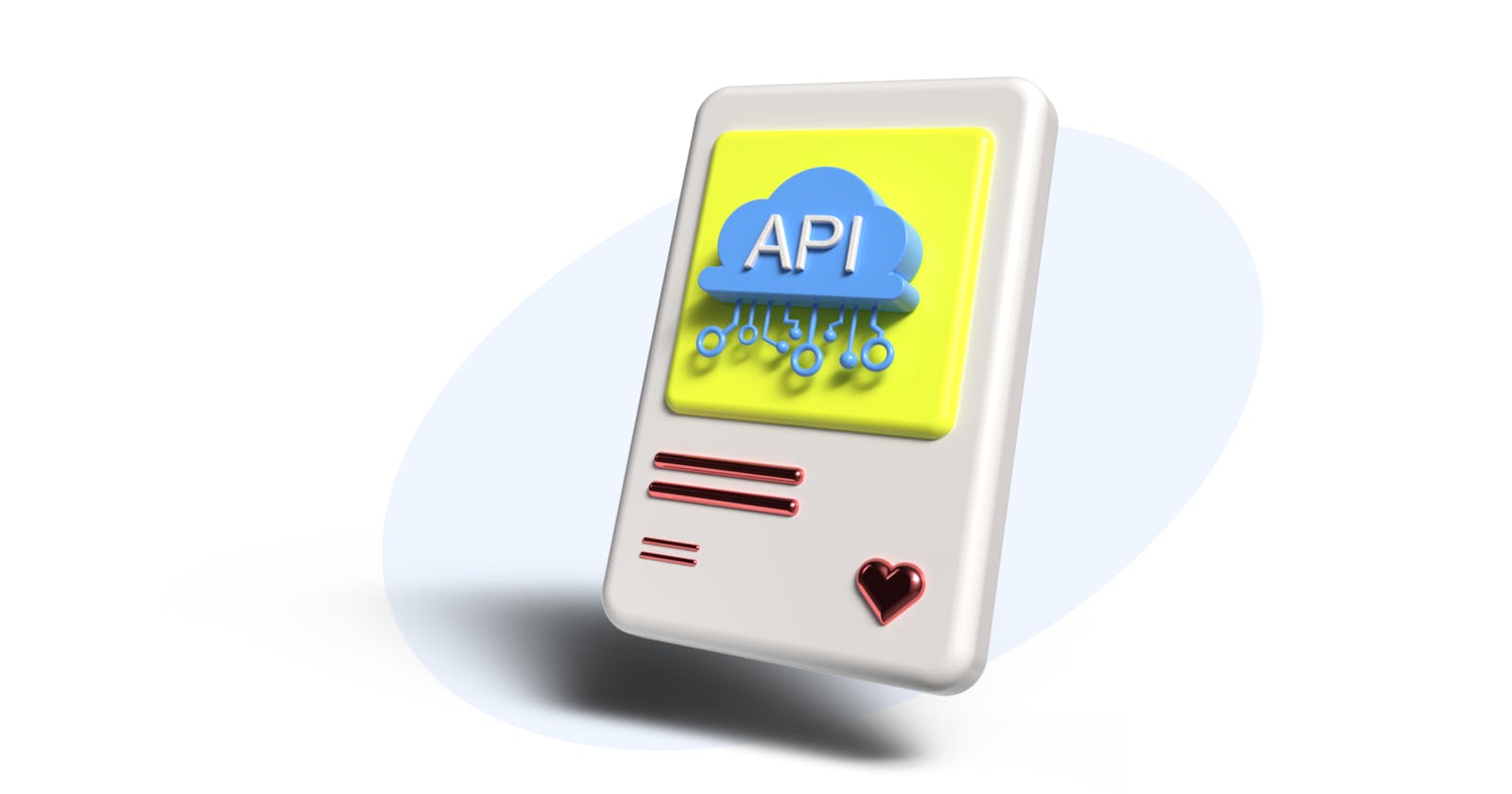Introduction
APIs help you create high-quality and maintainable decentralized applications (dApps) that interact with the blockchain to get information about blocks, transactions, metadata, token pricing, etc.
In this article, we’ll talk about different web3 platforms that provide efficient APIs that power communication between your dApps and the blockchain.
How Do dApps Communicate With The Blockchain?
DApps are blockchain-based applications that allow users to interact with smart contracts deployed on the blockchain.
Every dApp requires a remote procedure call (RPC) node to perform its functionalities, as it facilitates communication between your dApps and the blockchain.
This implies that without an RPC, your dApp will not be able to perform transactions on the blockchain.
What is an RPC Node?
Node: Computer or server
RPC is a traditional way of establishing a communication channel between two or more systems in different locations.
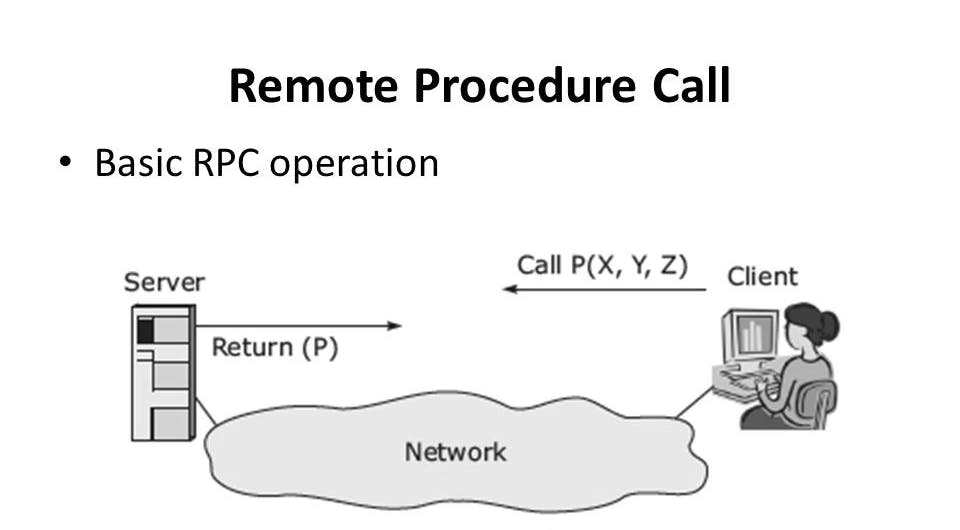
An RPC node is also called the brain-box of crypto, since it manages the interactions between systems. In a distributed system (like your dApp), the execution of subroutines in separate places is frequent.
RPCs can be compared to Rest APIs, which you can host yourself, but they only entertain a GET and POST communication method between two different systems (your dApp and the blockchain). On the other hand, Rest APIs support the GET, POST, PATCH, PUT, and DELETE methods.
Should You Develop an RPC Node?
Short answer: No! Don't do it.
Long answer: RPC nodes can be very difficult to develop and maintain by yourself, especially if you're building one for your dApp with little to no knowledge of when and how to use them correctly.
Below are some of the limitations of developing and self-hosting an RPC node:
- RPCs are not standard, the concept can be implemented in different ways.
- RPCs require complex infrastructure to work properly.
- RPCs are time-consuming because of their complex infrastructure.
- RPCs are expensive to create and maintain.
- RPCs require a lot of resources.
- RPC is only interaction-based.
- Building around RPC Nodes is not a long-term solution.
RPC limitations can be exhausting. You probably don’t even need to develop or host an RPC node on your own because now, there are many web3 platforms that provide solutions to these limitations.
The RPC service providers offer a web3 backend service and some of the best web3 and NFT APIs to power your dApp with a small fee..
What Are Web3 APIs?
Web3 APIs are blockchain APIs made available by web3 platforms like Moralis, Alchemy and QuickNode. These platforms address the limitations of RCP nodes, and allow anyone to query data across multiple blockchain projects in a simple way that saves time and resources.
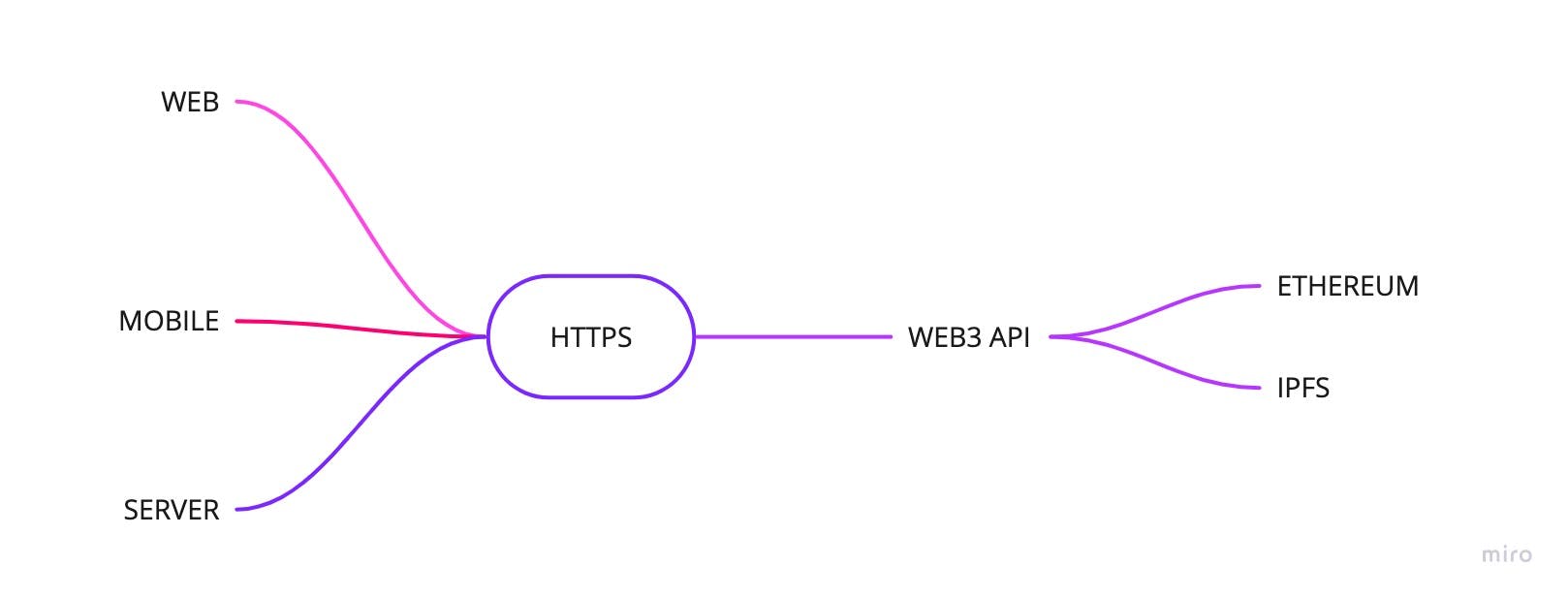
With a single line of code, web3 APIs can be used to authenticate a user and retrieve information about blocks, transactions, NFT metadata, token prices, etc.
Before creating an RPC from scratch, you should look at these web3 platforms to see whether they provide an API that caters to the requirements of your dApp.
The following are a few examples of dApps that can be created using the web3 and NFT APIs:
- NFT marketplace
- On-chain NFT games
- Digital Assets Ownership Verifier
- NFT minter
- Web3 authentication.
- NFT explorer.
Some of the web3 APIs and NFT APIs provided by Moralis, Alchemy, and QuickNode are listed below:
1. Moralis Web3 APIs
Moralis is a web3 platform that provides a backend service for blockchain projects. They offer the highest numbers of web3 and NFT APIs for authentication, blockchain account information, etc.
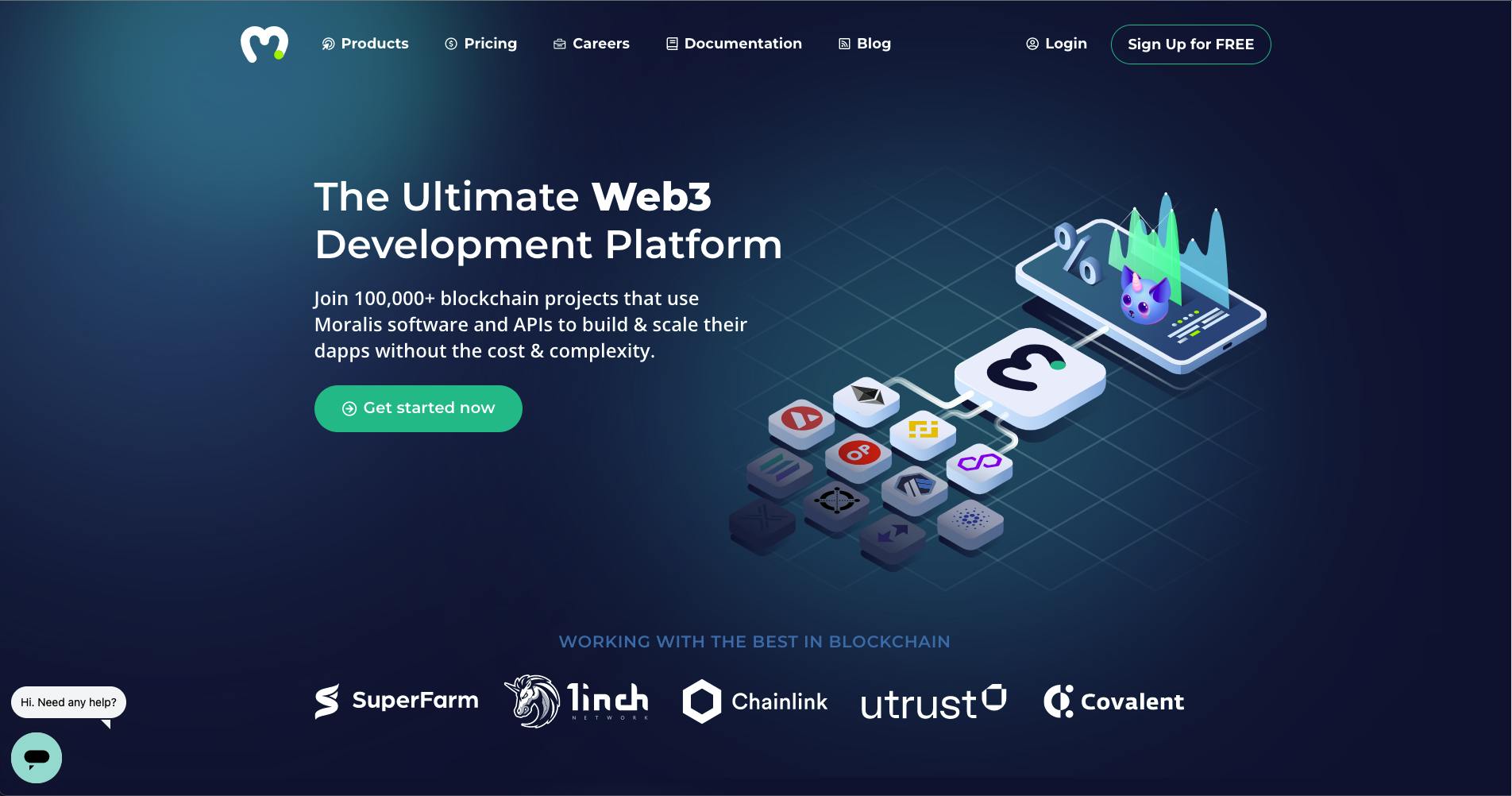
Moralis Web3 API - Authentication
Moralis allows you to authenticate users on any blockchain with just one line of code:
Moralis.authenticate()
Moralis Web3 API - Account Information
- Get the user's account transaction histories with Moralis web3 API:
const transactions = await Moralis.Web3API.account.getTransactions();
- Get the user's token balances with Moralis web3 API:
const balances = await Moralis.Web3API.account.getTokenBalances();
- Get ERC20 token transfers for the current user with Moralis web3 API:
const userTrans = await Moralis.Web3API.account.getTokenTransfers();
Moralis Web3 API -Native Asset Transfer
- Transfer tokens between accounts in ETH (Ethereum), BNB (Binance Smart Chain), and MATIC (Polygon) blockchain with Moralis web3 API:
// sending 0.5 ETH
const options = {
type: "native",
amount: Moralis.Units.ETH("0.5"),
receiver: "0x.."
};
let result = await Moralis.transfer(options);
Moralis Web3 API - File Upload (IPFS)
Moralis provides an endpoint to store and share files on the blockchain. This system is known as IPFSInterPlanetary File System (IPFS).
- Upload multiple files on the blockchain and place them in a Moralis folder directory with Moralis web3 API:
const options = {
abi: [
{
path: "moralis/logo.jpg",
content:
"iVBORw0KGgoAAAANSUhEUgAAABgAAAAYCAYAAADgdz34AAAABHNCSVQICAgIfAhkiAAAAAlwSFlzAAAApgAAAKYB3X3",
},
],
};
const path = await Moralis.Web3API.storage.uploadFolder(options);
Code snippets examples are from the Moralis Web3 API documentation.
2. Moralis NFT APIs
- Get all NFTs owned by the current user with Moralis NFT API:
const userEthNFTs = await Moralis.Web3API.account.getNFTs();
- Get any NFT transfers for the current user with Moralis NFT API:
const transfersNFT = await Moralis.Web3API.account.getNFTTransfers();
- Get the lowest price (in Eth) of any NFT in the last X days with Moralis NFT API:
const options = { address: "0xd...07", days: "3" };
const NFTLowestPrice = await Moralis.Web3API.token.getNFTLowestPrice(options);
- Get the NFT data based on a metadata search with Moralis NFT API:
const options = { q: "Pancake", chain: "bsc", filter: "name" };
const NFTs = await Moralis.Web3API.token.searchNFTs(options);
- Get NFT owners and an array with their NFT metadata (name, symbol) for a given token contract address with Moralis NFT API:
const options = { address: "0xd...07", chain: "bsc" };
const nftOwners = await Moralis.Web3API.token.getNFTOwners(options);
- Transfer NFTs from one account to another with Moralis NFT API:
// sending a token with token id = 1
const options = {
type: "erc721",
receiver: "0x..",
contractAddress: "0xc02aaa39b223fe8d0a0e5c4f27ead9083c756cc2",
tokenId: 1,
};
let transaction = await Moralis.transfer(options);
- Get NFT Metadata on Solana network with Moralis NFT API:
// get devnet metadata for a given SPL NFT address
const options = {
network: "devnet",
address: "6XU36wCxWobLx5Rtsb58kmgAJKVYmMVqy4SHXxENAyAe",
};
const nftMetadata = await Moralis.SolanaAPI.nft.getNFTMetadata(options);
Code snippets examples are from the Moralis NFT documentation.
3. Alchemy NFT APIs
Alchemy Web3 API is a drop-in replacement for web3.js, which was created to operate easily with Alchemy. It also provides powerful APIs to power dApps with features that aren’t available in ordinary nodes.
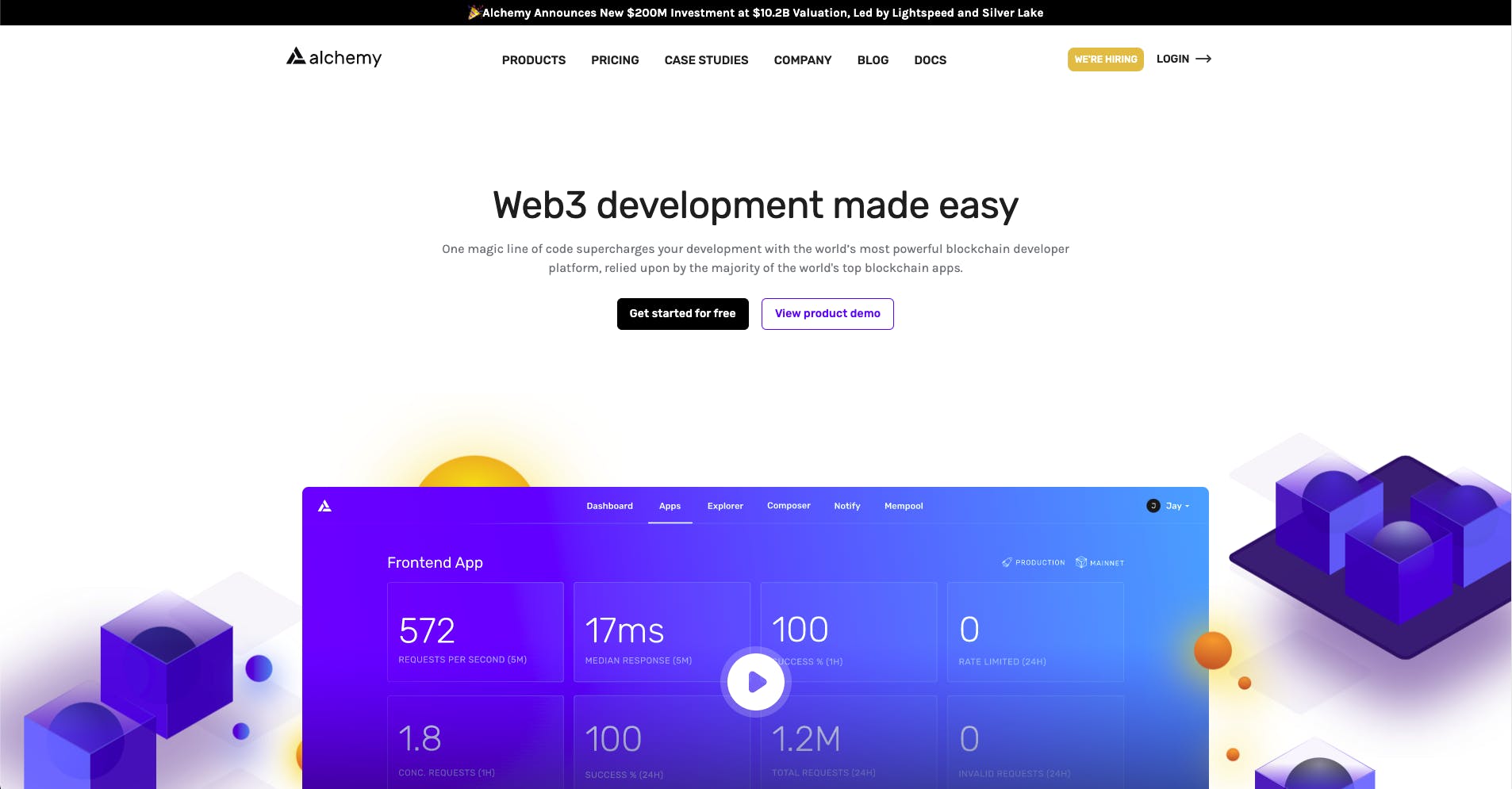
- Get all NFTs currently owned by a given address with Alchemy NFT API:
const nfts = await web3.alchemy.getNfts({owner: "0xC33881b8FD07d71098b440fA8A3797886D831061"})
- Get the metadata associated with a given NFT with Alchemy NFT API:
const response = await web3.alchemy.getNftMetadata({
contractAddress: "0x5180db8F5c931aaE63c74266b211F580155ecac8",
tokenId: "1590"
})
- Get the owner of a token for ERC721 and ERC1155 contracts with Alchemy NFT API:
import fetch from 'node-fetch';
var requestOptions = {
method: 'GET',
redirect: 'follow'
};
const apiKey = "demo"
const baseURL = `https://eth-mainnet.alchemyapi.io/v2/${apiKey}/getOwnersForToken`;
const contractAddr = "0x04b14e3383d42685ae16af3c47b21b2d5941d27e";
const tokenId = "867";
const fetchURL = `${baseURL}?contractAddress=${contractAddr}&tokenId=${tokenId}`;
fetch(fetchURL, requestOptions)
.then(response => response.json())
.then(response => JSON.stringify(response, null, 2))
.then(result => console.log(result))
.catch(error => console.log('error', error));
Code snippets examples are from Alchemy’s documentation.
4. QuickNode NFT APIs
QuickNode is a web3 platform that allows users to build and grow dApps through their RPC endpoints for over 10 networks, including Ethereum and Solana.
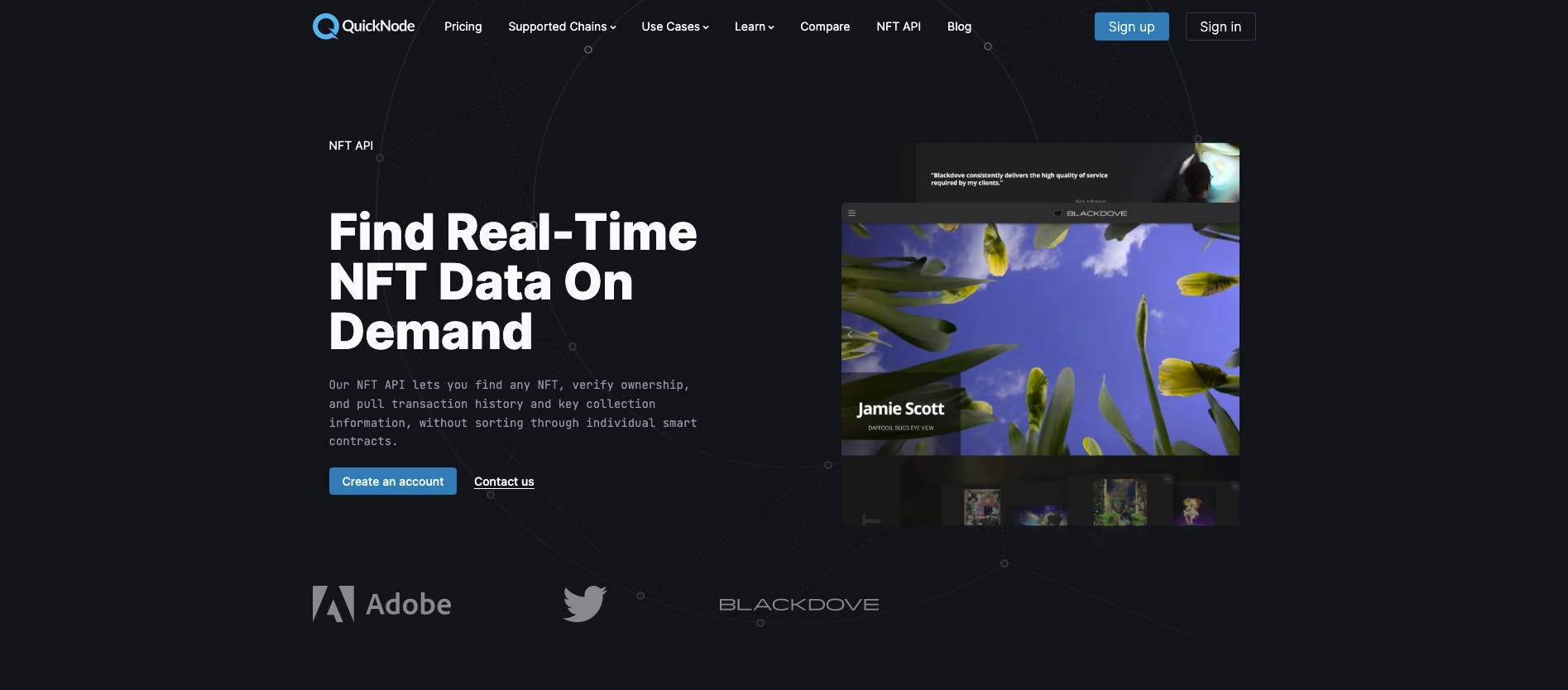
- Verify an NFT owner on the Ethereum blockchain with QuickNode NFT API:
const heads = await provider.send(
"qn_verifyNFTsOwner",
[
"0x8ae6422631292c31aeeb2efe154d6326f703f46b",
[
"0x60e4d786628fea6478f785a6d7e704777c86a7c6:1090",
]
]
- Fetch and filter NFTs from Ethereum and Solana networks with QuickNode NFT API:
const heads = await provider.send("qn_fetchNFTs", [
"0x63a63d7b0a4da84e095bac389845615a09e05546",
[
"0xba30e5f9bb24caa003e9f2f0497ad287fdf95623",
],
]);
- Find NFTs with their creators’ address with QuickNode NFT API:
// not currently supported by solanaJS
const axios = require("axios");
(() => {
const url = "https://quick-infra-structure.solana-mainnet.quiknode.pro/4456aaba19e98f28c900e9d5f997d6f39728f551/";
const config = {
headers: {
"Content-Type": "application/json",
},
};
const data = {
jsonrpc: "2.0",
id: 1,
method: "qn_fetchNFTsByCreator",
params: [{
creator: "5GUrnehPCrVeAeo29sgH3KbPhTvEDaH8HJqonYUceVM",
page: 1,
perPage: 3
}]
};
axios
.post(url, data, config)
.then(function (response) {
// handle success
console.log(response.data);
})
.catch((err) => {
// handle error
console.log(err);
});
})();
- Get gas price with QuickNode NFT API:
const ethers = require("ethers");
(async () => {
const provider = new ethers.providers.JsonRpcProvider("http://sample-endpoint-name.network.quiknode.pro/token-goes-here/");
const gasPrice = await provider.getGasPrice();
console.log(gasPrice);
})();
- Get user wallet balance with QuickNode NFT API:
const ethers = require("ethers");
(async () => {
const provider = new ethers.providers.JsonRpcProvider("http://sample-endpoint-name.network.quiknode.pro/token-goes-here/");
const balance = await provider.getBalance(
"0x8D97689C9818892B700e27F316cc3E41e17fBeb9",
"latest"
);
console.log(balance);
})();
Code snippets examples are from QuickNode documentation.
Wrapping Up
You’ve probably realized why building an RPC from the ground up might not be the best solution for your dApp. Instead, it might be easier to leverage web3 and NFT APIs from web3 API providers like Moralis, Alchemy, and Quicknode.
Using web3 and NFT APIs speeds up and ensures the reliability of your development. You should also explore each web3 and NFT API provider to see which one provides the best solutions for your dApp.
Where Do You Go Next?
Now that you've learned about web3 and NFT APIs to power your dApps:
- Learn How to Build Your Own NFT Explorer with Moralis React SDK here.
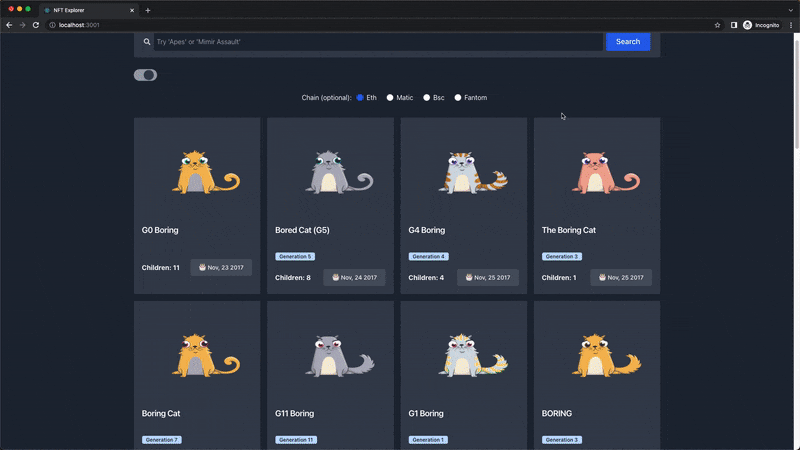
- Learn How to Build a Web3 Login with Web3.js Library here.
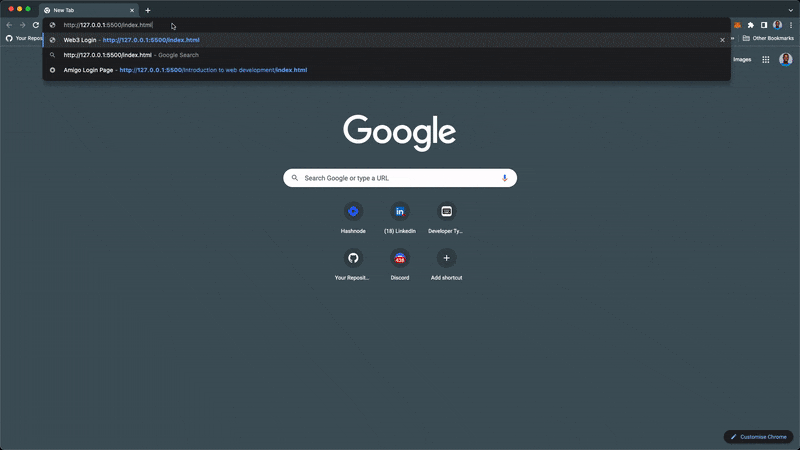
- Solidity Tutorial - Learn How to Build Your First Smart Contract here.
This article is a part of the Hashnode Web3 blog, where a team of curated writers are bringing out new resources to help you discover the universe of web3. Check us out for more on NFTs, DAOs, blockchains, and the decentralized future.

